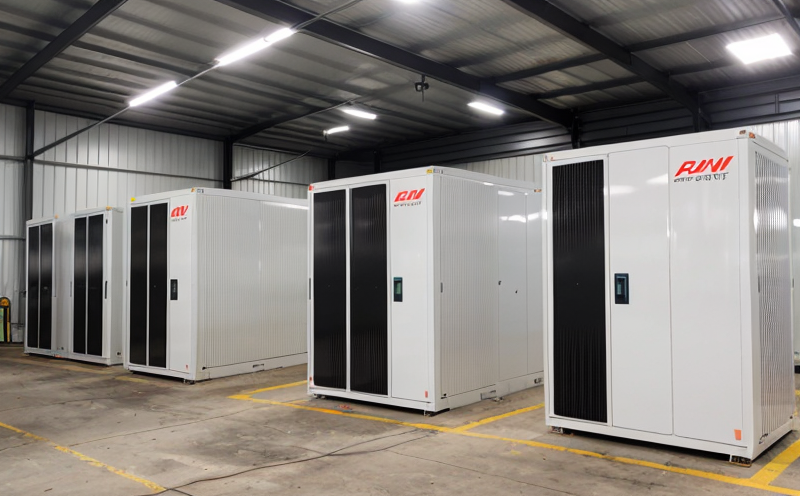UL 9540 Energy Storage System Safety Testing
The UL 9540 standard is a critical benchmark for ensuring the safety of energy storage systems (ESS) in residential, commercial, and industrial settings. This standard addresses potential hazards such as overheating, short-circuiting, fire risks, and other issues that can arise from improper design or manufacturing practices.
The testing protocol under UL 9540 encompasses a series of comprehensive tests aimed at evaluating the structural integrity, thermal stability, and electrical performance of ESS. These tests are designed to simulate real-world conditions and ensure that products meet stringent safety requirements before they reach the market. The standard is widely recognized in North America and is often required by regulatory bodies for compliance.
The testing process involves multiple stages, including structural integrity checks, thermal cycling, overcharge protection verification, and more. Each test is conducted to assess a specific aspect of the ESS's performance under various stress conditions. The goal is to ensure that the system can withstand these stresses without compromising safety or performance.
For quality managers and compliance officers, ensuring adherence to UL 9540 is essential for maintaining a competitive edge in the renewable energy sector. By adhering to this standard, manufacturers can demonstrate their commitment to product safety and regulatory compliance, which is crucial for gaining market acceptance and trust.
R&D engineers play a pivotal role in the development of ESS products. They rely on UL 9540 testing to validate their designs against industry best practices. The test results provide valuable feedback that can be used to refine product specifications and enhance overall performance. For procurement professionals, UL 9540 compliance is also important as it ensures that they are sourcing high-quality components from reliable suppliers.
The UL 9540 standard covers a wide range of ESS systems, including lithium-ion batteries, lead-acid batteries, and other types of storage solutions. By focusing on the structural integrity, thermal stability, and electrical performance of these systems, the standard ensures that they are safe to use in various environments.
Testing under UL 9540 is not a one-time process; it requires ongoing evaluation as new technologies emerge and market conditions evolve. Regular testing helps manufacturers stay ahead of potential hazards and maintain their compliance with regulatory requirements. This continuous improvement approach ensures that ESS products remain safe and reliable throughout their lifecycle.
The UL 9540 standard is closely aligned with other international standards such as IEC 62619, which provides additional guidance on the design and testing of energy storage systems. By adhering to these standards, manufacturers can ensure that their products meet both regional and global safety requirements.
UL 9540 testing is a rigorous process that involves multiple stages, each designed to assess different aspects of ESS performance. The testing protocol typically includes:
- Structural Integrity Checks: Ensuring the physical durability of the system under various conditions.
- Thermal Cycling: Evaluating the system's ability to withstand extreme temperature fluctuations.
- Overcharge Protection Verification: Confirming that the system can safely handle overcharging scenarios without damage.
- Short-Circuit Testing: Assessing the system's response to short-circuits and preventing catastrophic failures.
- Fire Hazard Assessment: Evaluating the potential for fire and ensuring that the system is designed to minimize this risk.
Scope and Methodology
| Test Type | Description | Purpose |
|---|---|---|
| Structural Integrity Checks | Evaluating the physical durability of the system. | To ensure the system can withstand environmental stresses without compromising safety or performance. |
| Thermal Cycling | Simulating extreme temperature changes to assess thermal stability. | To confirm that the ESS can operate safely within a wide range of temperatures. |
| Overcharge Protection Verification | Ensuring safe handling during overcharging scenarios. | To prevent potential damage to the system and ensure user safety. |
| Short-Circuit Testing | Evaluating the response to short-circuits. | To assess the ability of the ESS to handle abnormal electrical conditions safely. |
| Fire Hazard Assessment | Evaluating potential fire risks and mitigations. | To ensure that the system is designed with fire safety in mind. |
Eurolab Advantages
At Eurolab, we offer unparalleled expertise and resources to meet the rigorous requirements of UL 9540 testing. Our team of experienced engineers and technicians is dedicated to providing comprehensive support throughout the testing process. From initial consultation to final report generation, our services ensure that your ESS products are thoroughly evaluated for safety and compliance.
We utilize state-of-the-art equipment and facilities designed specifically for UL 9540 testing. Our advanced instrumentation allows us to conduct precise and accurate tests, ensuring reliable results. Our commitment to quality control is reflected in our adherence to international standards such as ISO/IEC 17025, which ensures the highest level of competence and reliability.
Our experienced professionals can help you navigate the complexities of UL 9540 testing. We offer a range of services tailored to your specific needs, including:
- Comprehensive Consultation: Guiding you through the testing process from start to finish.
- Customized Testing Solutions: Developing bespoke test protocols to meet unique product requirements.
- Advanced Instrumentation and Equipment: Leveraging cutting-edge technology for accurate and reliable results.
- Compliance Verification: Ensuring that your products meet all relevant safety standards.
- Reporting Services: Providing detailed reports that document the testing process and results.
Environmental and Sustainability Contributions
By ensuring compliance with UL 9540, Eurolab contributes to environmental sustainability by promoting the safe deployment of energy storage systems. The use of ESS helps reduce reliance on fossil fuels, thereby lowering greenhouse gas emissions and mitigating climate change impacts.
- Emission Reduction: By replacing traditional power sources with renewable energy storage solutions, we help decrease overall carbon footprints.
- Resource Efficiency: Properly designed and tested ESS systems enhance the efficiency of energy use, leading to reduced waste generation.
- Risk Mitigation: Ensuring that ESS products are safe through rigorous testing helps prevent accidents and environmental disasters.





